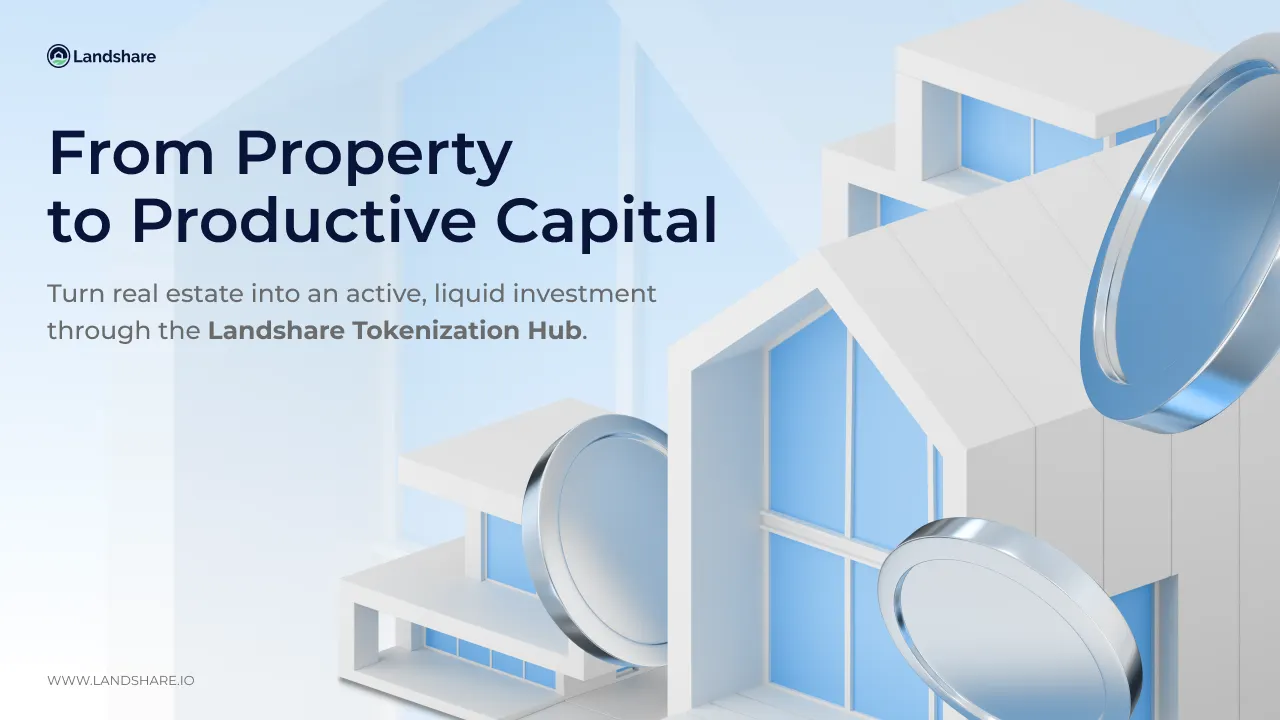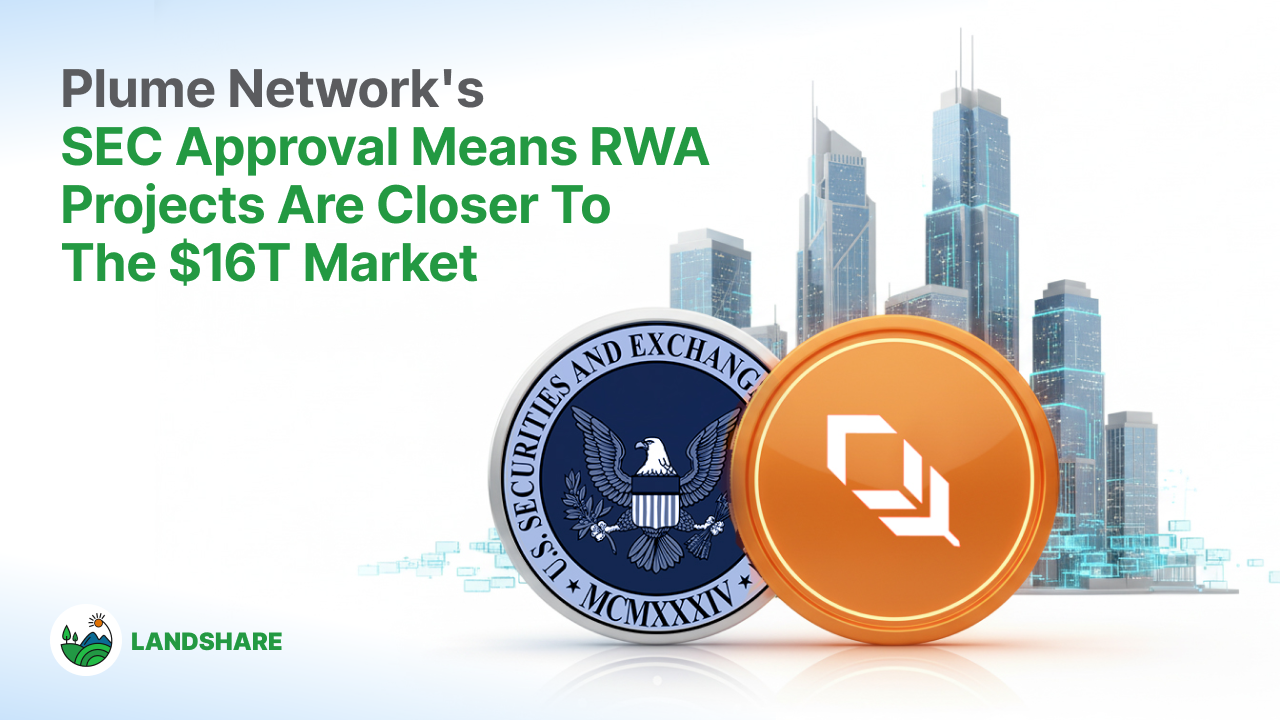Landshare Development Update — February 27th, 2024
Landshare Team
.png)
Hello everyone, and welcome to the latest Development Update! It’s been a little over 2 months since we released the Landshare RWA Token, our most ambitious platform update yet. This update was the result of several months of hard work from the whole team, but we knew it only represented the first step in building the tokenized real estate ecosystem that we envision for Landshare.
After the successful launch, we immediately started thinking about what we needed to accomplish next to continue moving Landshare. As a result, we crafted 4 Core Priorities for 2024:
- Increased accessibility & integration: Making it easier to access Landshare’s core features; providing additional value through new partnerships and listings
- Visibility & Community Engagement: Spreading the word about Landshare; leveraging the power of our community to assist in those efforts; creating opportunities for the community to provide direct and actionable feedback
- Feature development & app improvements: Continuing to build upon and improve our existing features; developing new features which improve the usability and utility of the LAND and LSRWA Tokens; identifying and fixing bugs
- Property expansion & diversification: Seeking new opportunities in the real estate space; providing RWA Holders with a diversified and expanded property investment pool
Each of our 4 Core Priorities are represented in our Q1-Q2 Roadmap:

In this update, we’re putting a special spotlight on our upcoming partnerships and integrations with several amazing projects across the RWA Space. We also have a major update on one of our top initiatives to improve platform accessibility, some new DAO proposals, and a new quality-of-life update about to go live.
Finally, we have an important update for all Gate.io users and traders.
Let’s dive in!
Card payments
Rapid onboarding is paramount to a deeper level of engagement with the platform, and one of the biggest hurdles to new users is funding gas tokens for a DEX swap or signing up for a new exchange account. As a result, credit card payment options have been on our radar for a very long time.
As part of our 2024 Roadmap, we’re finalizing an agreement with a trusted crypto payment processor to finally enable credit and debit card payment options for our platform! This integration will enable eligible users to purchase up to $500 in LAND directly from the website or app, eliminating one of the most common barriers for new users.
The card payment option is expected to go live next week and will initially support only the LAND Token. However, we’re also working to enable LSRWA purchases through the same process. Stay tuned!
Dark Mode
After many requests from the community and a successful DAO vote, we’ll be adding a dark mode option to the app in the coming days. To enable dark mode, scroll to the bottom of the page and move the slider to the nighttime position when the update goes live.
New DAO Proposal: Referral System
A new proposal has hit the Landshare DAO, designed to create a referral system for Landshare RWA Tokens. Here is a summary of the proposal:
Why should we implement a Referral System?
As we strive to enhance user engagement and expand our user base, it’s essential to leverage the power of referrals, because this is one of the best Marketing Tools that exist. One other Positive is, that you only pay for the Marketing when the user did the Action — in this case, he buys the $LSRWA-Token.
How exactly could that work?
Im thinking about a PPL (Pay Per Lead) Programme, where the refferer is reffering a new user to buy $LSRWA-Tokens. The referrer would then be rewarded after the reffered person held the $LSRWA Token some time (1–6 Months perhaps). This additional Time is neccessary to frontrun abuse of the System.
We could also give the referred Person a little benefit (discount, NFT, whatever) for his 1st Purchase, after he held some time, to make the System even more attractive.
How to finance?
This could be financed by a part of the normally burned Land Tokens (of every buy) for example. Instead of burning the full 10% of $LAND of a Buy, we could just burn 7,5% and the remaining 2,5% goes to the refferer as a reward.
Click here to read the full proposal and cast your vote. If passed, the team will construct a refined version of the proposal for the Quarterly DAO Vote at the end of Q1.
Upcoming Integrations
Over the past several months, we have been in discussions with dozens of amazing projects in the emerging RWA space. We always seek new opportunities to expand our product accessibility, utility, and visibility through integrations and partnerships. In this section, we’ll be covering a few of our future integrations, but as always — there’s more to come!
Chainlink CCIP
The future of markets is on the blockchain, and the future of blockchain is cross-chain. It is more important than ever to develop applications that are seamlessly interoperable across multiple blockchain networks. We envision the Landshare RWA Token as a DeFi-integrated, omni-chain asset for the tokenized future.
The first step in this process is the integration of Chainlink CCIP, a secure blockchain interoperability protocol built by Chainlink Labs. CCIP enables seamless cross-chain token transfers and allows us to craft a multi-chain ecosystem. When fully integrated, most or all features available on BSC will also be available on all other supported chains.
Once implementation is complete, CCIP will allow us to build partnerships and integrations with virtually any project across the RWA Space, improving the utility and accessibility of our core features. Integrations are one of our 4 Core Priorities for the year, and CCIP is the crucial first step to unlocking these opportunities.
Plume Network
Plume is the first modular L2 blockchain dedicated to all real-world assets (RWAs) that directly integrates asset tokenization and compliance providers into the chain.

We recently had a Twitter Space with Plume’s co-founder, Teddy, and have had additional discussions with the Plume Network team behind the scenes. We are excited about their vision and are planning to build on the Plume Network as part of our broader cross-chain strategy.
Plume is still in the Testnet phase, but we are looking forward to building with them all the way to the Mainnet launch. Stay tuned for more announcements regarding this partnership soon!
IX Swap
IX Swap is an RWA platform that offers trading solutions akin to Uniswap for Real-World Assets (RWA) & Security Tokens (STO). This is precisely the type of product we feel is necessary for the development of a vibrant RWA ecosystem, so we knew IX Swap was a perfect fit.

Initially, we will be collaborating with IX Swap for Twitter Spaces and other activities to spread the word about the RWA narrative and how DeFi primitives like decentralized exchanges (DEX) can help craft a tokenized economy for the future. Later this year, we plan a full integration, including LSRWA integration into the IX Swap ecosystem.
Gate.io Ticker Change
Gate.io will be changing our token symbol from LAND to LANDSHARE and plans to take the deposit, withdrawal and trading services for Landshare (LAND) offline, including spot trading, quantitative trading, and liquidity mining on February 28, 2024, 06:00 A.M. UTC. After the renaming is completed, Landshare will be relisted with the new token symbol LANDSHARE.
This renaming is merely a change in name and does not involve any blockchain migration. Gate.io users don’t need to do anything in particular. To read the full announcement post from Gate, click here.
Closing Thoughts
To wrap up this development update, we want to sincerely thank our community for their continued support and enthusiasm. The past few months have been incredibly productive, and our upcoming integrations will take us one step closer to a fully realized tokenized real estate ecosystem.
We also understand that many members are eagerly awaiting news about new exchange listings and other developments not mentioned in this post. Rest assured, we are working hard to deliver the entire roadmap in the expected time frame and will have more information to share in future updates.
Last but not least, we’d like to extend a warm welcome to all of our new community members! We’ve seen some exceptional growth in recent weeks and expect to see this trend continue as the RWA narrative continues to gain momentum. If you’re new or have been away for a while, be sure to check out our guides to learn about all the ways you can earn with Landshare’s ecosystem:
- How to invest in real estate with Landshare
- How to stake Landshare Token (LAND)
- How to stake LAND-BNB LP Tokens
- Landshare NFT Quickstart Guide
As always, if you have any questions, concerns, or suggestions, don’t hesitate to reach out to us on our Telegram group or other social media channels. Remember — your participation and feedback are vital to the success of Landshare!
Follow Landshare:
Twitter | Medium | Youtube | Telegram | Telegram Announcements | Coinmarketcap | Zealy
Landshare October Recap
Landshare Team
October was a milestone month for Landshare – one that set the stage for the next era of on-chain real estate. From the official Landshare v2 announcement to new ecosystem updates, governance decisions, and exciting community initiatives, we’ve laid the groundwork for a future defined by growth, utility, and innovation.
This month, we introduced the framework that will redefine how investors, property owners, and DeFi users interact with real estate on-chain. Let’s recap the highlights 👇
Landshare v2 Announcement
The official unveiling of Landshare v2 signaled the start of a new chapter – one built around real utility, real yield, and real scalability.
Landshare v2 isn’t just an upgrade. It’s the foundation of a self-sustaining ecosystem where tokenized real estate finally reaches its full potential. The new system transforms stable assets into active yield-generating opportunities, seamlessly connecting traditional markets to DeFi.
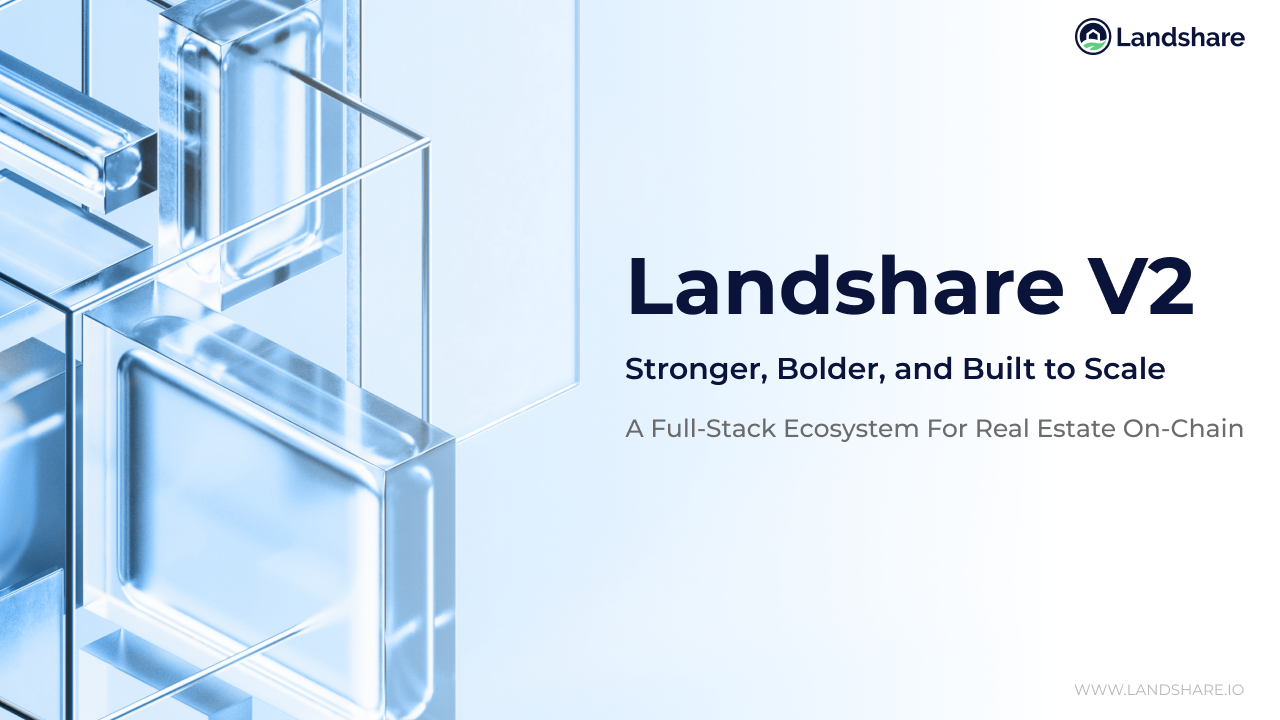
The Three Pillars of Landshare v2
In our follow-up deep dive, we explored the three core pillars that form the foundation of Landshare v2:
- The Real Asset Vault (RAV): A seamless gateway for stablecoin holders to earn real yield backed by tokenized properties.
- The Tokenization Hub: A complete solution for property owners to bring their assets on-chain.
- The DeFi Suite: Tools and incentives that amplify participation and utility across the ecosystem.
Together, these pillars create a self-sustaining growth loop, where every user and property strengthens the entire network.
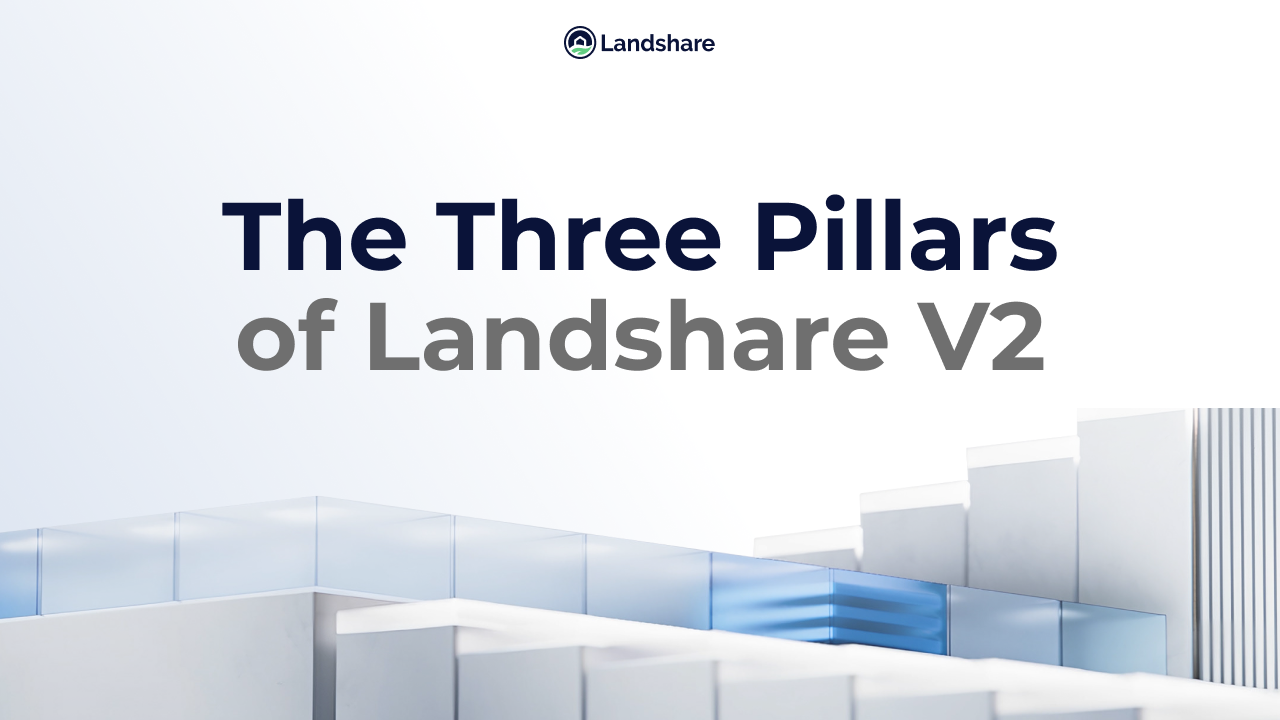
DAO Proposal Passed
In late October, the community voted to reduce LP emissions by 50% across both the LAND–BNB and LSRWA–USDT pools – with the proposal passing at 62.28% in favor.
This important step helps:
✅ Reduce daily LAND inflation
✅ Strengthen token scarcity and price stability
✅ Extend the reward pool lifespan
✅ Encourage long-term liquidity participation
The change will take effect within 48 hours of approval and marks another move toward a more balanced, sustainable economy for Landshare v2.
🗳️ View the full proposal and results
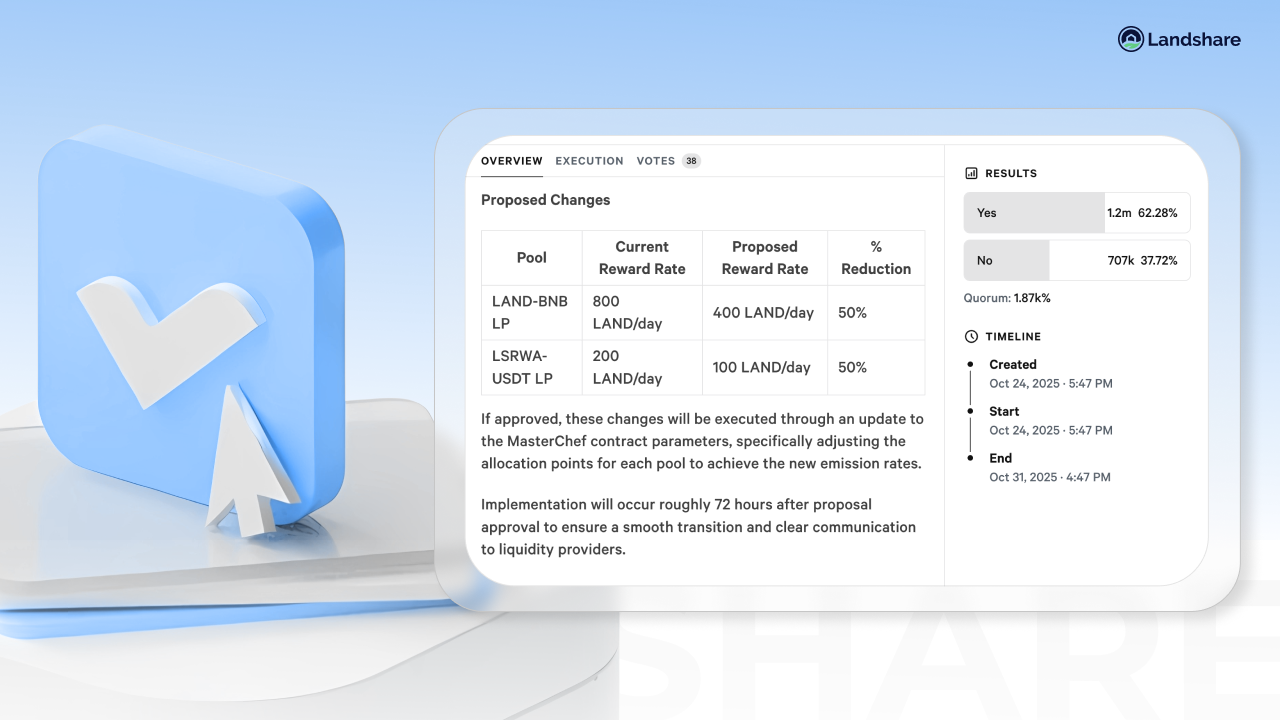
Tokenization Hub Breakdown
We released a comprehensive guide to the Landshare Tokenization Hub, explaining how property owners can now go beyond simple tokenization to access real investors, liquidity, and on-chain utility.
The Hub bridges traditional real estate with blockchain finance – creating a pathway for real-world assets to generate ongoing yield, transparency, and accessibility.

4.5M+ LAND Staked
October also marked another key milestone – over 4.5 million LAND tokens (nearly half of the total supply) are now staked in vaults. This incredible community achievement reflects growing confidence in Landshare’s long-term vision and token utility.
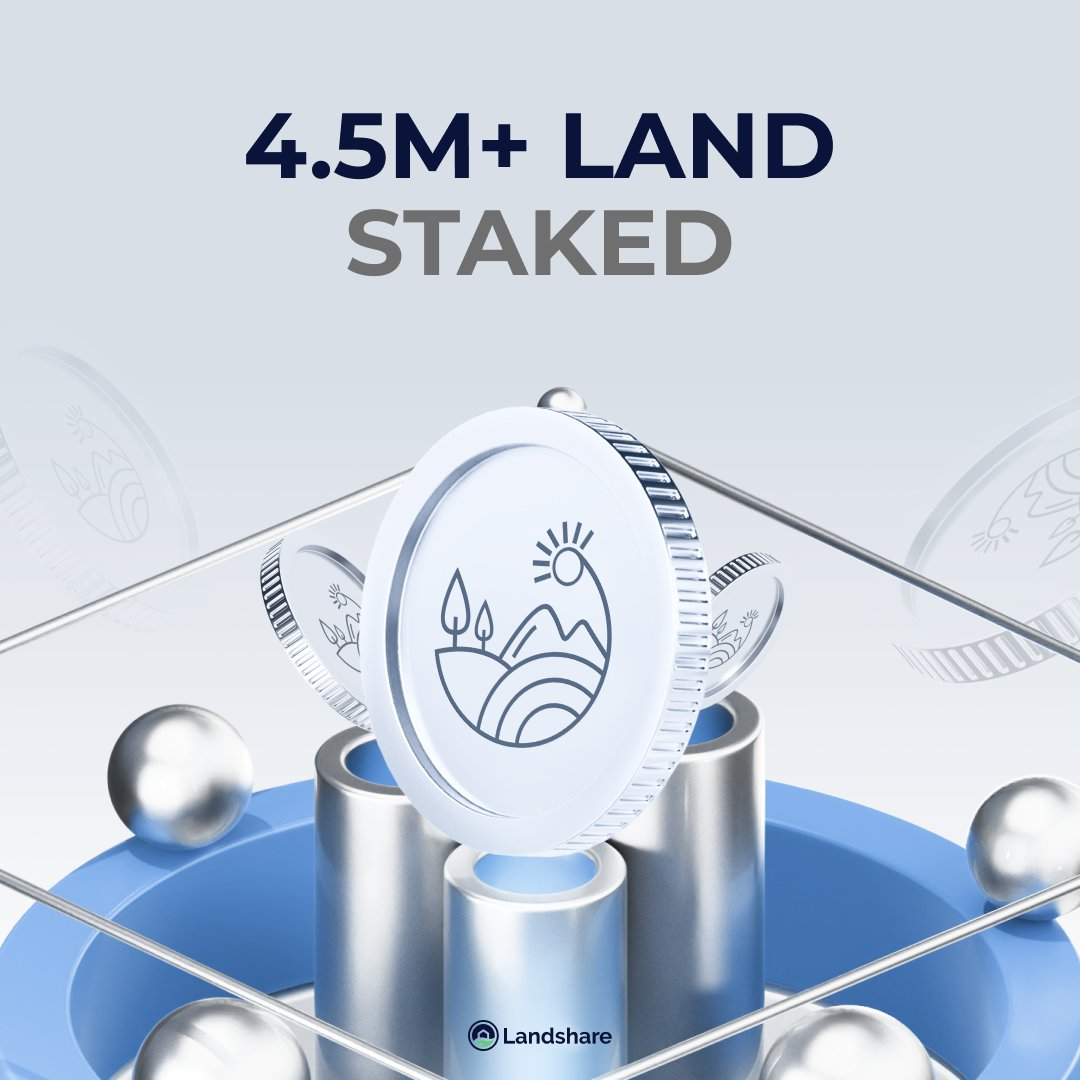
Community Townhall Incoming
We’re excited to announce our next Community Townhall, happening Thursday, November 6 at 12 PM CST or 6 PM CET on X Spaces!
Join Jordan (CEO), Travis (Co-Founder), and Ivan (CMO) as they discuss everything happening with Landshare v2, recent DAO proposals, and take your questions live.
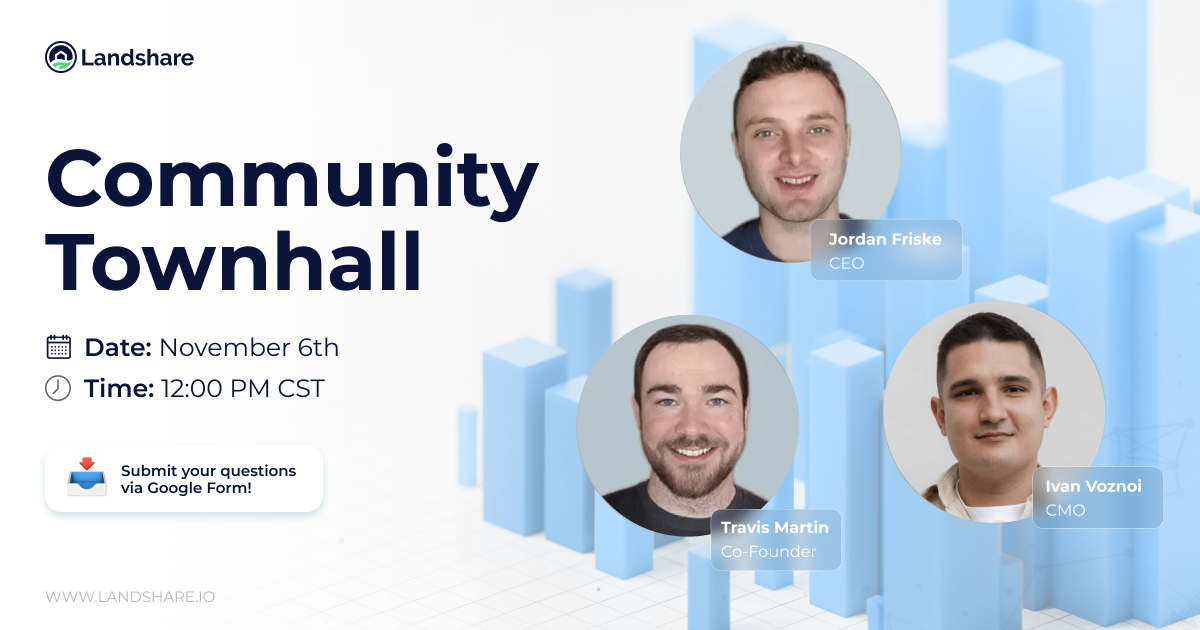
Looking Ahead
With Landshare v2 on the horizon, the foundation is set for a new phase of growth and adoption. In the coming weeks, we’ll be sharing more details on the RAV launch, the Points Campaign, and other major milestones driving our ecosystem forward.
Stay tuned – the future of real estate is being built on-chain, and we’re just getting started.
Tokenization Hub Breakdown
Landshare Team
Real estate tokenization has been a buzzword for years. Yet in practice, most projects have failed to move beyond press releases and empty promises. Too often, blockchain has been used as a veneer to package illiquid or low-quality assets, leaving investors with tokens that serve little purpose and property owners with no meaningful results.
Without investors, liquidity, or secondary markets, tokenization becomes little more than an on-chain spreadsheet — a digital record of ownership that no one can trade or invest in. For property owners, that means time and money spent “tokenizing” without achieving key goals: raising capital, expanding visibility, or unlocking value.
A Smarter Path Forward
For real estate tokenization to truly work, it needs to deliver tangible investment outcomes. After years of building and refining on-chain real estate products, Landshare has developed a model designed to do exactly that.
The Landshare Tokenization Hub transforms tokenization from a passive concept into an active investment process — connecting high-quality properties with real investors, liquidity pathways, and a live blockchain economy.
The Tokenization Hub Solution
Most platforms stop once a token is created. Landshare’s Tokenization Hub goes further , offering a complete pathway for property owners to bring their assets on-chain and immediately engage investors.
Each project is structured for success from day one, with:
- Customized tokenization models tailored to each property
- Transparent fundraising mechanics with defined soft and hard caps
- Built-in integration with the broader Landshare ecosystem
By connecting directly to Landshare’s existing network of investors and DeFi infrastructure, offerings can attract participation as soon as they launch. Once a fundraising goal is met, property tokens are deposited into the Landshare RWA Pool, linking them to ongoing liquidity, yield mechanisms, and secondary market exposure.
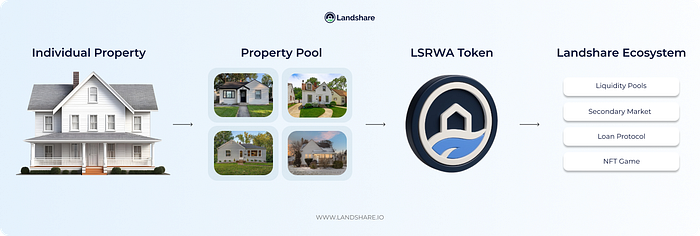
Why This Model Delivers Real Results
Where others leave property owners to manage marketing, compliance, and liquidity alone, the Tokenization Hub handles these as part of a unified process. This integration dramatically increases the likelihood of meeting fundraising goals and sustaining long-term engagement.
Integration with the Landshare RWA Token (LSRWA) is central to this model. Rather than isolated tokens with no market, each property becomes part of a shared, liquid environment that generates yield and investor participation. Individual assets can still be represented, extracted, or traded independently when needed.
For example, a multifamily property owner might tokenize 20% equity to raise $500,000 on-chain, connect the asset to the RWA Pool for ongoing yield, and maintain full transparency for investors — all within a compliant, accessible framework.
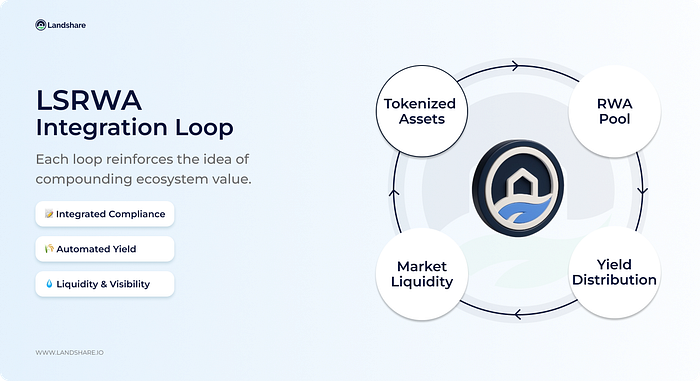
How It Works
- Tokenize the Property: Landshare collaborates with property owners to create a digital representation of equity, income rights, or hybrid participation.
- Launch the Offering: The property is listed on the Tokenization Hub with defined terms, caps, and transparent investor access.
- Fundraising & Validation: Investors participate directly on-chain. Once the soft cap is reached, funds are secured and the offering is finalized.
- Ecosystem Integration: Tokens are deposited into the Landshare RWA Pool, and investors receive LSRWA tokens representing pooled value and yield potential.
- Ongoing Value Creation: Property owners gain lasting benefits through liquidity, visibility, and investor engagement. As new assets are added to the pool, owners can rebalance between equity and cash, making real estate a more dynamic and liquid asset than ever before.

Built for Real-World Impact
The Landshare Tokenization Hub is more than a technical service — it’s a complete ecosystem designed to make real estate investment active, liquid, and accessible.
For property owners, it offers a streamlined way to raise capital and connect with global investors.
For investors, it provides exposure to yield-generating, on-chain assets backed by transparent real-world value.
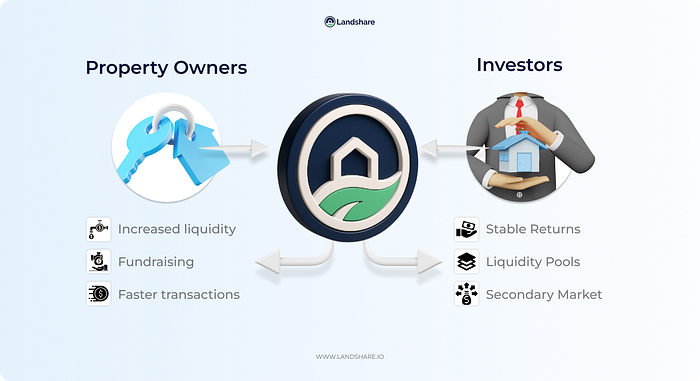
In an industry crowded with static tokens and overhyped promises, the Tokenization Hub delivers what tokenization was always meant to achieve — real outcomes, real liquidity, and real-world results.
🏡 About Landshare
Landshare is a tokenized real estate ecosystem that enables seamless investment in real-world assets on the blockchain. With Landshare, you can own a share of a real-world property simply by holding our RWA Tokens ($LSRWA). Our platform offers a secure, transparent, and efficient way to invest in real estate without traditional barriers.
- Website: landshare.io
- Twitter: @Landshareio
- Community: t.me/landshare
Plume Network's SEC Approval Means RWA Projects Are Closer to the $16T Market
Landshare Team
On October 6, Plume Network announced on its social media that it had been approved to be an SEC-registered transfer agent. This is a big milestone for the RWA industry, signaling that the traditional financial system is welcoming tokenized assets.
Transfer agents basically manage important back-end work and are the official record-keepers for securities issuers. So, essentially, they maintain shareholder registries, record ownership changes, issue certificates, and handle other corporate actions.
Plume’s approval means these critical functions can now be managed on-chain for tokenized securities. This is a pretty big deal, as it gives Plume and its users formal regulatory standing under U.S. law for on-chain securities.
Experts believe that this approval can boost the global RWA market, and top players like Landshare can benefit from it due to the increased regulatory clarity.
Why is the SEC’s Approval Important for Plume Network?
So, first, understand the roles of a registered transfer agent to get a better understanding of its importance.
In traditional finance, a transfer agent is usually a company or bank that tracks who owns a company’s securities and facilitates trades. They ensure every share transfer, stock split, or dividend payment is accurately recorded and reported. Now, let’s understand how this traditional role will work in the world of blockchain.
Post Link
By replicating these roles on-chain, Plume’s platform can securely log every token sale or dividend distribution in an immutable ledger, while also syncing with regulators. As Plume explains, its transfer-agent protocol will “link cap tables and reporting directly to SEC and DTCC systems”.
This means tokenized equity and debt on Plume can behave like traditional securities, but will be managed better with the help of blockchain technology.
Plume’s CEO believes that this regulation “exists to protect investors’ rights as shareholders,” and Plume’s on-chain solution is meant to simplify the processes under that framework.
Its Impact:
Experts believe that the registration will open up several doors for the RWA market because of the ‘trust factor’. Being registered means there are no risks as far as legality is concerned. When an industry or its top player receives a green flag from the government regulatory agencies, institutional capital follows.
BlackRock, Fidelity, JP Morgan, etc., are already looking to build blockchain-based products. This will further invite them to join the RWA growth story and possibly super-boost it.
Moreover, another important benefit is that tokenized securities can now flow through compliance obstacles. This means issuance times can be cut from months to weeks with the help of smart contracts. Similarly, on-chain dividends and ICOs can enjoy the same legal protections as Wall Street offerings.
What Does This Mean For The RWA Market?
Plume’s win comes at a time when analysts are already forecasting a massive growth in tokenized RWAs over the next decade. Institutions now value tokenization as a way to digitize everything from private credit to real estate. Also, the numbers are pretty optimistic as well.
A Boston Consulting Group report estimated the global asset-tokenization market could reach about $16.1 trillion by 2030. The industry has already grown by almost 380% in the past three years. To put things into perspective, today’s entire crypto market cap is smaller than those figures. Even some of the more conservative forecasts still show multi-trillion growth.
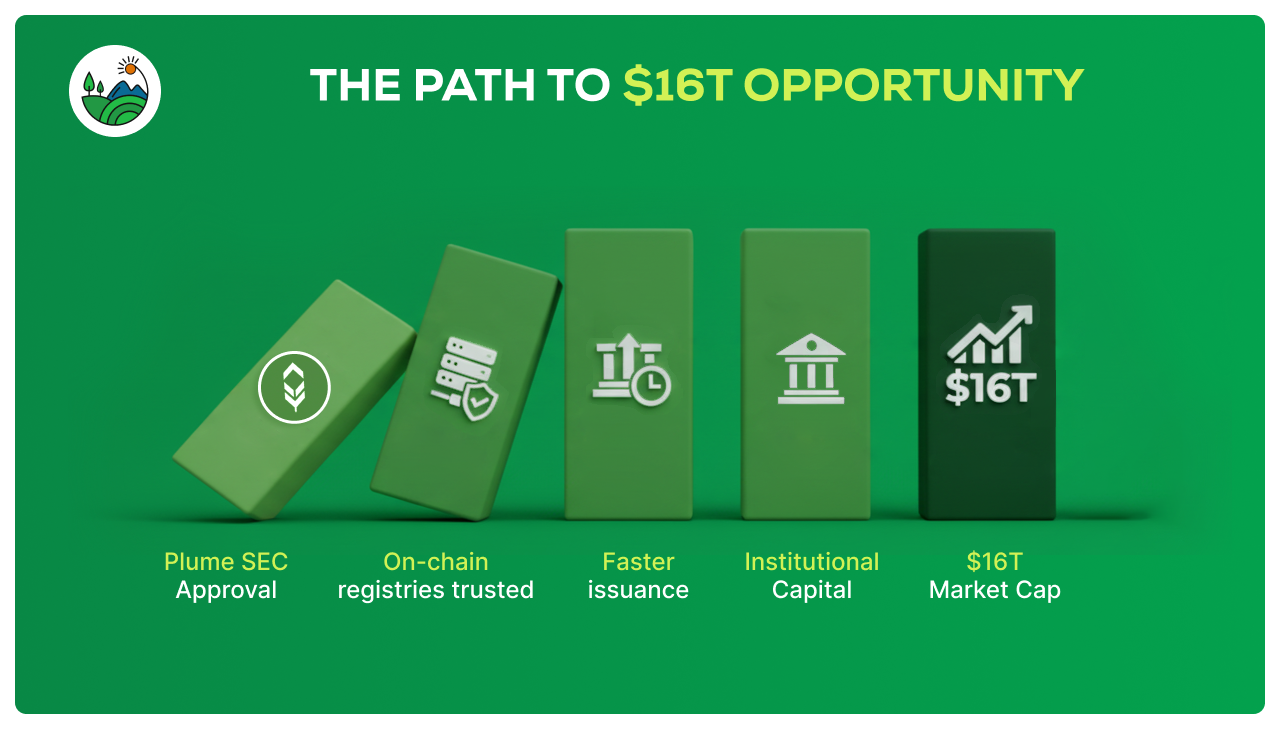
If these estimates can materialize in the days to come, RWA is well-positioned to be one of the largest markets in the world of modern finance.
Moreover, the external conditions are favoring this industry. Governments and regulators worldwide are creating proper frameworks. For instance, Asia-Pacific markets are running pilots for digital bonds and crafting standardized rules for security tokens.
These developments and the excitement of retail investors in this category build confidence that the $16T opportunity is actually very real.
How Will Landshare Benefit From This?
Landshare stands at the forefront of benefiting from this opportunity because of its early entry and real-world utility. This is very important as institutions seek new projects that have use cases that can help them capture a considerable market share.
Moreover, Landshare already operates as a compliant RWA platform. For instance, each Landshare RWA Token (LSRWA) is a security token representing fractional shares of a U.S. real estate portfolio, and buyers must pass KYC/AML checks.
The fact that regulators are now approving on-chain transfer agents shows the industry’s efforts are finally paying off. Here are some more factors that can help Landshare be one of the top RWA contenders:
1. Regulatory Credibility: Plume’s SEC status essentially means that tokenized securities can operate within established rules. Landshare’s approach aligns with these principles. So, investors can be assured that their projects sit within a legal framework designed to protect shareholders.
2. Investor Confidence: Every step toward clear regulation lifts confidence. The recently passed GENIUS Act, the SEC’s staff statements on liquid-staking, and the Trump administration’s overall outlook towards the crypto market have been fairly positive.
Similarly, Plume being approved as a SEC-registered blockchain transfer agent tells retail and institutional investors that projects like Landshare aren’t mere experiments. They’re rather a part of a regulated financial evolution.
Moreover, it means regulators see value in on-chain tokens, and that kind of signal helps legitimize the space Landshare operates in.
3. Landshare’s Own Progress: Landshare isn’t about hype. It is rather focused on delivering value from day one. The project has already sold four houses on the BNB chain. It is also providing consistent rental returns to the investors in its properties.
Moreover, the team remains focused on delivering stable, compliant returns from real estate growth.
Conclusion
So, now we know that the recent news was about more than just Plume Network being approved by the SEC to be a transfer agent. It rather has a much bigger impact on the RWA market as a whole.
While the industry continues to grow, for Landshare, it is the right time to innovate further and add more value to consumers’ lives.






